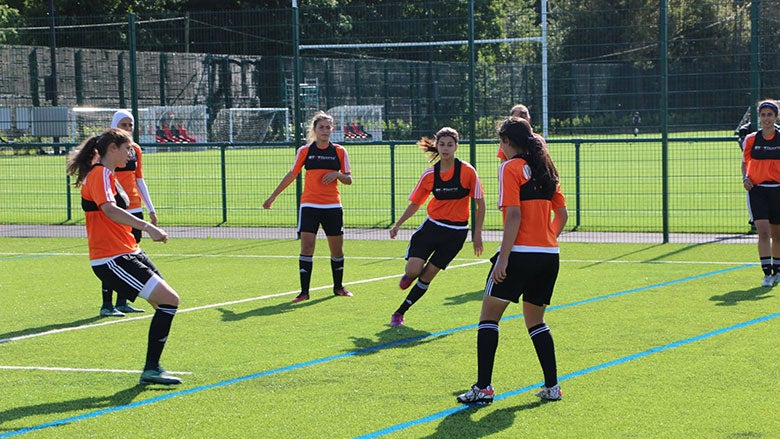
“Come get your daughter. She’s playing soccer with the boys,” said the neighbor to my mother one hot summer day in the early ’90s. I will always remember the look on our neighbor’s face. She opened her bedroom window on the second floor and looked below at the children playing soccer in the dirt field across from the apartment building where she lived in Amman, Jordan. She was a middle-aged woman, with short brown hair and a pointy nose. She lived in the same neighborhood where I played soccer with my cousins. I don’t remember her name but I’m going to call her “The Neighbor”. The Neighbor saw me from her window. We exchanged looks. Hers was of disapproval, mine was of fear. Fear of being caught.
The Neighbor called my mother immediately and complained. My mother was generally not worried about my teenage soccer ambitions and hadn’t prevented me from pursuing my passion, but that day she succumbed to the pressure of being shamed for letting her daughter play with the boys outside for everyone to see.
Girls didn’t play soccer in Jordan in the early ’90s, and The Neighbor was not one who would challenge taboos. The day my mother caved in to the cultural shaming was the day that my soccer ambitions ended. The incident left me with a scar, leading me to try to live vicariously through my daughter by encouraging her to pursue soccer in the suburbs of Washington, DC. A few months ago I narrated my sad soccer story to my daughter and explained to her that she was lucky to have such an opportunity not only to play soccer in the city league, but to also have a female as her coach.
But as I lost my chance to pursue my soccer dreams, I’m happy to report that this is no longer the case for my fellow Jordanian women. Since the early 2000s there has been a cultural shift in the country as girls soccer began to be introduced in schools, an initiative spearheaded by Jordan’s Prince Ali bin Al Hussein. Women's soccer was officially launched in Jordan in 2004, leading to the creation of U-19, U-17 and U-14 teams, in addition to the opening of scouting centers for six to 14-year-olds.
The change that has occurred in Jordanians’ perspective of soccer is outstanding and worth celebrating. Jordan is currently gearing up to host the Under-17 World Cup on September 30, 2016. This would be the first female soccer World Cup in the region, and the biggest sporting event in the country's history.
It goes without saying that empowering women to pursue sports not only leads to inclusion, but also contributes to a prosperous society. In an interview with the Washington Post, Samar Nassar CEO of the Under-17 World Cup organizing committee discussed how Jordan’s female soccer players are making a difference in their societies “You see them from all walks of life,” Nassar said. “You see the covered girl who’s actually doing this for a living, who is getting that money and supporting her family. And I think maybe it was a social taboo for her to play, but now when they see her on the pitch and excelling, and actually bringing money for that family, all of a sudden it becomes acceptable.”
The push to increase female participation in soccer is universal. FIFA is encouraging participation of females in soccer before the 2019 FIFA Women’s World Cup in France with its program “Live Your Goals,” which aims to “ensure that every girl and woman who wants to play the game has the opportunity to do so.”
I don’t know what happened to The Neighbor who ended my soccer ambition in the ’90s and if she still feels the same now about female soccer in Jordan in spite of the recent cultural shift. All I know is that prospects for Jordanian girls’ soccer is bright and I couldn’t be more pleased. I will make sure to watch the female soccer games at the Rio Olympics and the upcoming Under-17 World Cup with my daughter and emphasize to her that being a girl is empowering and that no obstacle should stop her from pursuing her dreams. Her future will be brighter than mine, and for that I’m pleased.


Join the Conversation